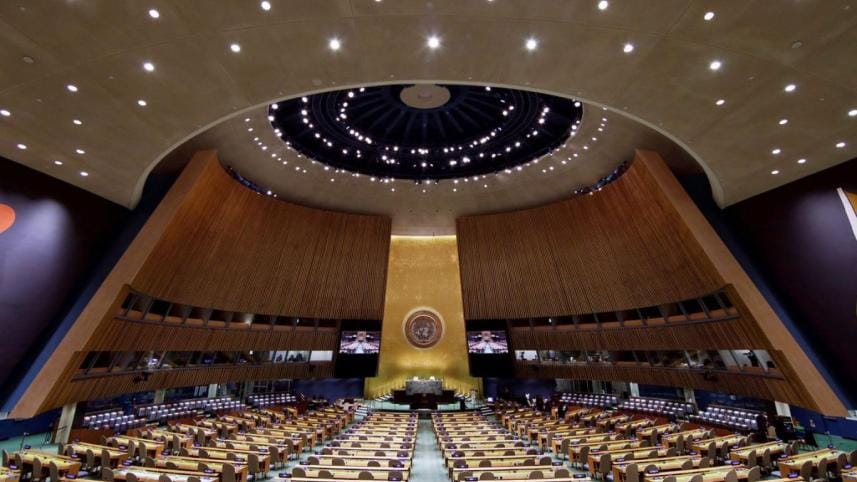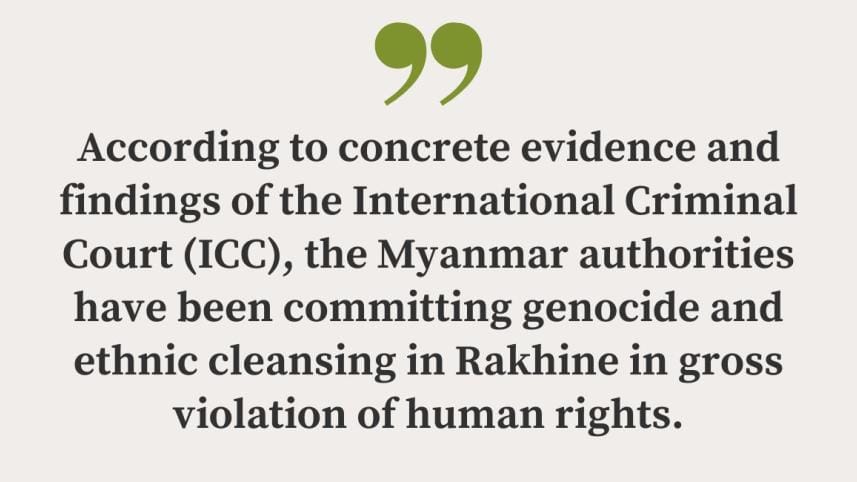The 77th UNGA and Rohingya Crisis

The 77th session of the United Nations General Assembly (UNGA), which commenced last week, would certainly reflect on the critical issues the world is currently faced with: the Ukraine crisis, global energy prices, widening trade deficits, and challenges in post-Covid recovery. However, it is necessary for the UNGA to attach priority to the Rohingya issue, too. The current session needs to build up on previous discussions and resolutions on the Rohingya crisis over the last few years, and undertake strengthened initiatives for implementation.
According to concrete evidence and findings of the International Criminal Court (ICC), the Myanmar authorities have been committing genocide and ethnic cleansing in Rakhine in gross violation of human rights. The crisis has deepened further during the past couple of years. In this context, the 77th UNGA needs to reflect on the imperativeness and urgency in implementing ICC decisions and provisions of international law. The Myanmar military government has been ignoring all concerns and appeals by the international community (both at bilateral and multilateral levels) to stop repression in Rakhine. Myanmar has not demonstrated minimum efforts on its part to cushion this crisis. The UNGA needs to incorporate provisions that would expose intransigence, lapses and deficiencies in compliance of UN decisions. Furthermore, this session should consider creating a "review mechanism" to hold Myanmar's military government accountable and make them face penalties accordingly.
The instability and chaos in some regions of Myanmar for the past two years may trigger further violence, and escalate breach of peace and security in the region and beyond. Unless the UN expands the level of policy intervention through effective coordination by all stakeholders in ensuring the return of displaced Rohingyas to their homeland, the critical humanitarian crisis may further aggravate. This will impede peace, stability, and development in the region.
Based on the resolutions previously adopted, the UN may consider adopting a new resolution incorporating a programme of action, asking Myanmar to stop genocide and all repressive actions in Rakhine and adjoining areas with immediate effect. Special provisions could be incorporated stating that further delay or failure in compliance of UN resolutions should lead not only to renewed sanctions, but also suspension of Myanmar from the UN membership. In the past, there have been instances of suspension of membership by the UN for similar violations of its charter.
A special session of the UN Security Council during the current UNGA session should be convened with a view to endorsing the proposed UNGA resolution that would ask Myanmar to take back the displaced Rohingyas after ensuring a congenial atmosphere for their return. The UNGA should consider deploying UN peacekeeping forces and multinational peace observers in Myanmar's Rakhine state and in bordering areas as well. The UN peacekeepers should be mandated to review and monitor the situation and recommend, if the situation warrants, UN-guided multinational intervention.
The proposed UN resolution during the current session should also have provisions for comprehensive sanctions against Myanmar, should the influx of Rohingyas from Myanmar continue. The UNGA may also ask the United Nations High Commissioner for Refugees (UNHCR) to set up a consortium to coordinate with all parties and stakeholders concerned for meeting necessary financial, operational and functional requirements related to Rohingya repatriation.

The 77th UNGA should also consider adopting a new convention (as a subsidiary to its human rights convention), titled "Security and Rehabilitation of Displaced and Stateless People," which would ensure binding provisions on Myanmar to take the Rohingyas back and ensure their safe and smooth settling down in their homeland. Based on the scale, magnitude and effectiveness of the UN's urgent intervention on the Rohingya crisis, the proposed convention will also operate as a mechanism for fast-track solutions on handling similar issues in any region in the future, should the need arise.
The proposed UN convention should include a legal provision to assess whether Myanmar's economic zone in the Rakhine state is contrary to international law. There is specific evidence that these projects have been planned and implemented by Myanmar without taking environmental, social and security safeguards into account. There needs to be UN-driven neutral investigations to assess and uncover the destructive impact of these projects in Rakhine on the interests of local residents, and on the bordering areas of neighbouring countries.
There is also a need to implement, on an urgent basis, the recommendation of the Kofi Annan Commission. In this respect, the UN may set up an implementation task force with specific guidelines and timeframe for implementation. The core strategies suggested by Bangladesh to implement the Kofi Annan Commission recommendation would lead to effective outcomes.
The UN may request its specialised agencies and multilateral development institutions to ensure Myanmar's compliance with UN resolutions, failing which comprehensive sanctions could be in force. The UNGA may consider proposing an interregional framework (comprising members of Saarc and Asean) with a view to facilitating inter and intraregional dialogues to ease the current impediments in Rohingya repatriation.
To facilitate and implement the above, the UN secretary-general should take into account the proposals on resolving the Rohingya crisis, submitted by Bangladesh, the OIC Secretariat and Asean, during the UNGA sessions since 2017, including the ongoing one. The 77th UNGA may also propose an Arbitration and Crisis Resolution Forum that would include non-government organisations, civil society, and private sector representatives to supplement government efforts and initiatives.
Dr Mohammed Parvez Imdad is an economist, governance specialist and policy analyst. He is the founder-president of the Bangladesh Knowledge Forum (BKF) and adviser at the Centre for Governance Studies (CGS). Views expressed in this article are the author's own.




 For all latest news, follow The Daily Star's Google News channel.
For all latest news, follow The Daily Star's Google News channel. 
Comments